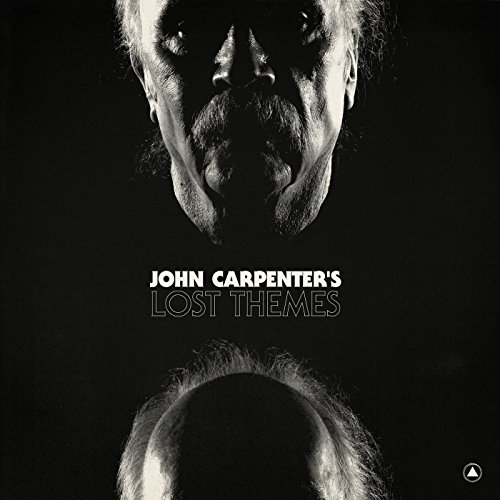
John Carpenter
Lost Themes
Release Date: Feb 3, 2015
Genre(s): Pop/Rock
Record label: Sacred Bones
Music Critic Score
How the Music Critic Score works
Buy Lost Themes from Amazon
Album Review: Lost Themes by John Carpenter
Very Good, Based on 10 Critics
Based on rating 8/10
Lost Themes is something of a post-modern marvel. After all, John Carpenter is one of America's most beloved filmmakers (amongst a certain cadre of viewer, at least), a figure who's responsible for a spate of the best horror, action, and dark comedy films of the '70s, '80s, and '90s. Essential to his films' success were their soundtracks—sparse, simple, all-synthesizer affairs rife with tension, dread, and drama, all of which were composed by Carpenter himself (occasionally in concert with Alan Howarth, a frequent collaborator).
Based on rating 8/10
Though his filmmaking career slowed in the 2000s and 2010s, John Carpenter's influence as a composer only grew. Along with Tangerine Dream, his immediately recognizable sound -- full of pulsing synths and ever-ratcheting tension -- inspired a new generation of acts like Zombi, Majeure, Umberto, Espectrostatic, and Geoff Barrow's Drokk project, among many others, so the timing couldn't have been more perfect for Carpenter to release new music when Lost Themes arrived. Despite that title, these songs aren't attached to any films; instead, they offer a multiplex worth of possibilities for listeners to soundtrack their lives.
Based on rating 8/10
The idea of John Carpenter having some lost theme songs kicking around in the vault from the many films he made and didn't quite make seems very plausible, but according to the 67-year-old filmmaker and musician, there is nothing left over that he didn't use. For his debut album, he set out to make brand new music. While he always made music to images in the past, Lost Themes is a purely aural experience that he says allowed him more freedom than ever.
Based on rating 7.6/10
Since his career began in the mid-1970s, John Carpenter has been responsible for an admirable run of well-loved science fiction and horror films. Many of his features had low budgets but a lot of style. They were dark, dystopian, and violent (though seldom gory), with plots that glued together genre conventions drawn from westerns, '50s monster flicks, and exploitation cinema.
Based on rating B
John Carpenter will always be best known for his work as a creator of horror films. This fact alone drowns out the praise for many of his best qualities. He’s a meticulous director with an eye for subtleties: Watch Halloween and just try to spot each time Michael Myers is hidden somewhere in plain view. He’s a genius interpreter who puts his own twisted spin on ideas that have been covered before.
Based on rating 7/10
While not every film in his catalogue has been a winner—he does seem to have peaked and fallen after a heyday of successes)—genius director John Carpenter has more unique successes completed on his own terms than virtually any other director. Even many of his derided and unsuccessful films have been re-evaluated and lauded with praise after their release. Critics may have hated The Thing (1982) upon its release, but it is widely and wildly acclaimed today.
Based on rating 6.5/10
John Carpenter's image has long been that of a highly individualistic master craftsman with a throwback sensibility. In addition to directing, he's often written his own scripts, occasionally produced and edited his own films, and almost always created his own synthesized scores. While his philosophy may have been rooted in post-Watergate paranoia, his visual sense was informed by the lofty aesthetic virtues of old school Hollywood filmmaking.
Based on rating 2/5
Director-composer John Carpenter's skeletal, synth-heavy soundtracks were a hallmark of his Seventies and Eighties sci-fi and horror movies, from Halloween to Escape From New York. They've also influenced plenty of electronic music and art pop. Now, at 67, Carpenter is releasing his first true solo album (made with his son and godson), which has elements that might appeal to metalheads, goths and minimalist-EDM fans alike.
Opinion: Very Good
John Carpenter presents a curious anomaly. Primarily known for contributing to the re-energisation of the horror film that took place during the 1970s and early 1980s, it could none the less be argued that it's as a musician that has influence has been the most widespread. Carpenter (occasionally with sound designer Alan Howarth) wrote and recorded a series of electronic scores for his own films – including Escape From New York, Assault On Precinct 13 and Halloween – which have arguably influenced aspiring artists more than the films themselves.
Opinion: Very Good
John Carpenter — Lost Themes (Sacred Bones)How much you enjoy this album depends on how seriously you take it. If you go in expecting the work of some composerly dark magus, you will be deeply disappointed. John Carpenter builds songs around his own basic, sometimes comically limited plinkings on the keyboard. But if you approach Lost Themes with a sense of humor, there are some cheap thrills to be had.
'Lost Themes'
is available now

